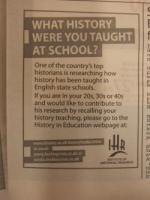Surveys
Shortly after starting the Project in 2009, we faced the challenge of finding teachers and former pupils who would volunteer to be interviewed for our oral history archive. We wanted a broad spread of ages, experiences and locations across England. In order to identify potential interviewees who had something interesting to say, we devised a detailed survey form – two sides of A4 – which we hoped would enable us to select the most ‘representative’ group of interviewees available.
- Project questionnaire about school history - Pupils
- Project questionnaire about school history - Teacher
We were helped by our network of supporters – history teachers (both current and retired) were contacted via the branches of the Historical Association and at conferences of the Schools History Project and other regional networks. We were assisted greatly by the printing of a letter in SAGA Magazine which drew in many responses from former pupils in the over-50s age group. The Daily Mail  generously donated advertising space for us to reach the younger age groups. All told, we received 341 survey forms (205 from former pupils and 136 from current or retired teachers) either in paper form or electronically.
generously donated advertising space for us to reach the younger age groups. All told, we received 341 survey forms (205 from former pupils and 136 from current or retired teachers) either in paper form or electronically.
The amount of information on the forms varied, but many survey respondents wrote at length, including interesting anecdotes and a huge amount of information about their school history. The survey forms became a source of evidence for the Project in their own right and are included on this website in digest documents which show all the responses to particular questions, which are ‘themed’. The information is anonymised, though where a respondent was later interviewed, this is indicated.
The following documents contain more information on the surveys and the way in which the information is arranged:
Pupil surveys
Primary school memories have been collated by the decade of birth. Respondents born in the 1930s recalled being ‘taught in air raid shelters situated in school playing fields, sitting on wooden benches. Obviously (it was) not possible to go on school visits, or practical projects. I think we learnt historical dates ‘by rote’, whereas those at primary school in the 1960s were busy with projects, such as this one on ‘Ancient Egypt. We went by train to the British Museum to see the Tutankhamen exhibition. I recall making huge paintings of the artefacts found in the tomb with my friends. We were fascinated by the gory bits, of course!'. The primary school memories for each decade can be downloaded here:
- Pupils born 1910s-40s primary school memories
- Pupils born 1950s primary school memories
- Pupils born 1960s primary school memories
- Pupils born 1970s primary school memories
- Pupils born 1980s primary school memories
Secondary school memories were often detailed, some delighted at recalling their interest in history at school, others anguished at the boredom they endured. The digests are based on ‘themes’ which correlate with the questions on the survey forms – for instance, ‘how we were taught’, ‘syllabus’ or ‘examinations’ and ‘outings and trips’ – they can be downloaded here:
- Pupils born 1910s-40s secondary school general impressions
- Pupils born 1910s-40s textbooks
- Pupils born 1910s-40s syllabus
- Pupils born 1910s-40s aids to lessons
- Pupils born 1910s-40s outings activities clubs etc
- Pupils born 1950s-90s how we were taught sec school
- Pupils born 1950s-90s secondary school history curriculum
- Pupils born 1950s-90s exam courses
- Pupils born 1950s-90s aids and activities
Teacher surveys
Most of our teacher respondents were/are secondary school history teachers, though a few have worked in primary or middle schools – these are indicated in each document at the start of each relevant entry. We have divided up the teachers’ responses into categories such as ‘memories of being taught history’ (which records their own experience as a pupil) ‘becoming a teacher’ which details their teacher training experiences, and such topics as 'teaching career', ‘history curriculum’ and ‘status of history’, all of which detail changes they have seen across their whole career. The teachers’ memories are also arranged by decade of birth, so it is possible to trace changes over time within the profession, as well as individual careers. The entries have been anonymised and the names of individual schools removed. The digests of teachers’ surveys can be downloaded here:
- Teachers born 1920s-30s memories of being taught history
- Teachers born 1920s-30s becoming a teacher
- Teachers born 1920s-30s history curriculum and practice in schools
- Teachers born 1920s-30s aids to teachinglearning
- Teachers born 1920s-30s status of history
- Teachers born 1940s-80s own education
- Teachers born 1940s-80s teaching career and curriculum change
- Teachers born 1940s-80s approach to teaching
- Teachers born 1940s-80s aids to learning
- Teachers born 1940s-80s status of history
